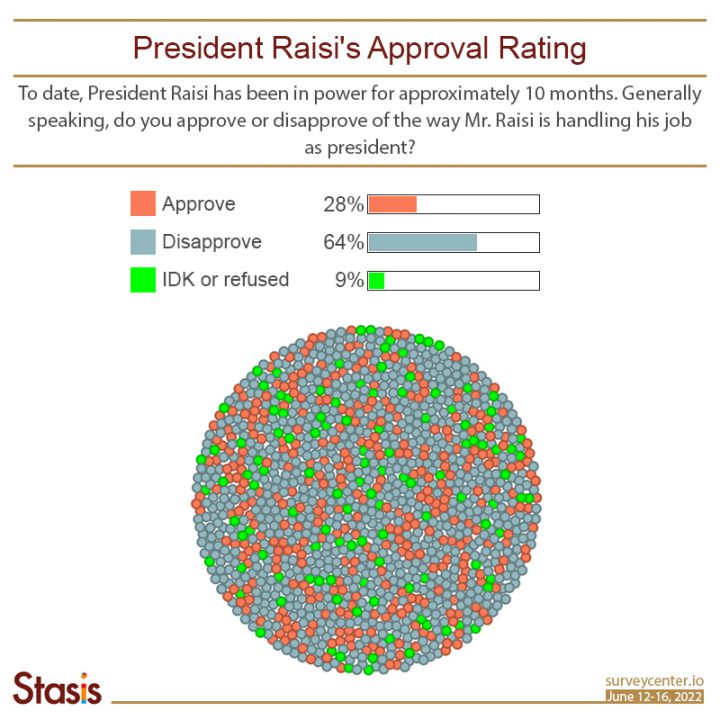
Iranians Have Distrust in the Government and Disapprove the President
Stasis Consulting: The poll conducted by Stasis Consulting on June 12-16, 2021, shows that President Raisi’s job approval is 28 percent which is a record low for any sitting Iranian president in the first year in office, at least since public opinion poll data has been collected on the matter, dating back to 1997. This study also shows that most Iranians have distrust in government, and they are pessimistic about their future. The single factor that Iranians thought could positively impact the future of the country is a successful nuclear agreement between Iran and the West which might improve their economic situation.
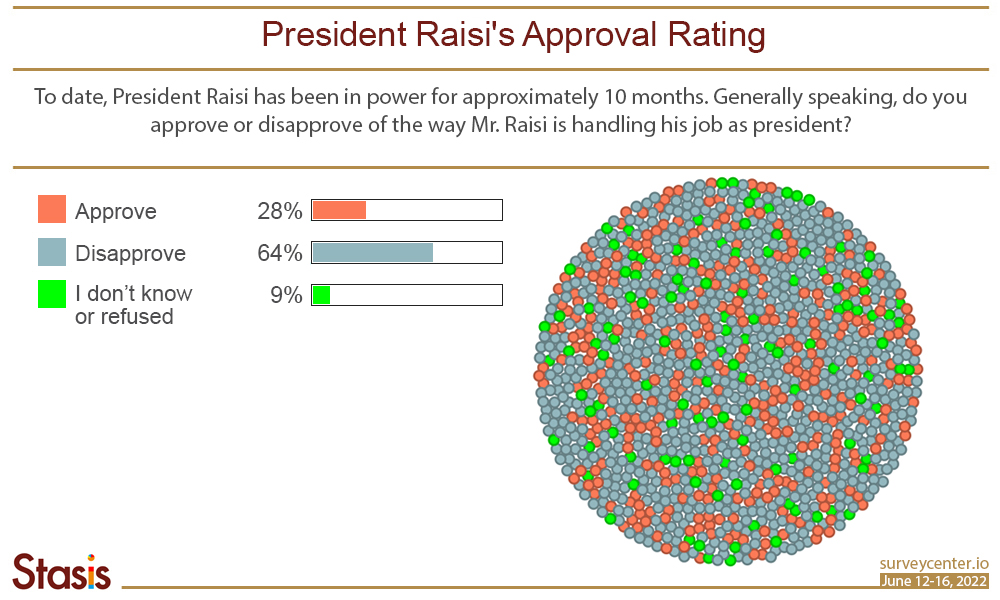
Stasis conducted the field study through phone interviews with a random sample of 1,197 Iranian residents aged 18 and older, from June 12 to June 16, 2022. The proportional two-stage sample includes respondents from every province in Iran. Provinces have been sampled based on their population. Results are also weighted by gender, age, and location (urban vs. rural areas) according to the Iranian national census of 2016 and 2018 statistical yearbook. Based on the sample, there is a 95percent confidence that the margin of sampling error is ± 2.8 percentage points.
The results of this poll have been interactively visualized in this link. This is an interactive platform detailing the results of every question, distinguished by gender, age group, location, and education in a bar chart.
Presidential Job Approval is Very Low
The survey results show that President Raisi’s job approval rating is 28 percent, which is a record low for any sitting Iranian president in the first year in office, at least since public opinion poll data has been collected on the matter, dating back to 1997. Sixty-four percent of Iranians disapprove of his job as president, including a total of 50 percent of respondents who strongly disapprove of him and 14 percent who somewhat disapprove of his job.
Question: To date, President Raisi has been in power for approximately 10 months. Generally speaking, do you approve or disapprove of the way Mr. Raisi is handling his job as president?
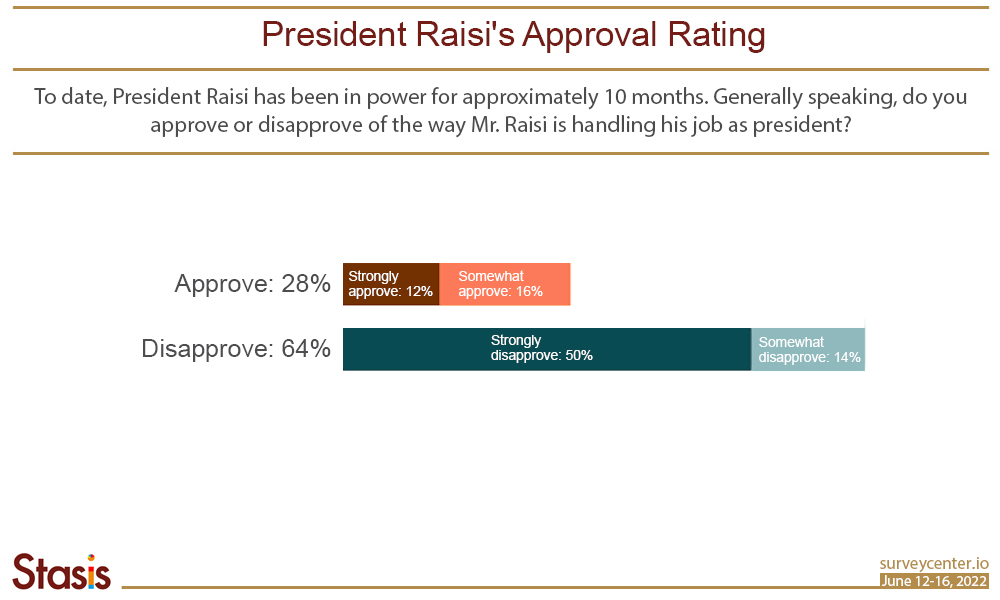
The president’s approval rating is significantly different across different age groups. Younger Iranians were more likely to say that they disapprove of the job of the president than the older generation. Only 23 percent of Iranians aged 18-29 approve of his job compared to a 30 percent approval rating among Iranians aged 30+.
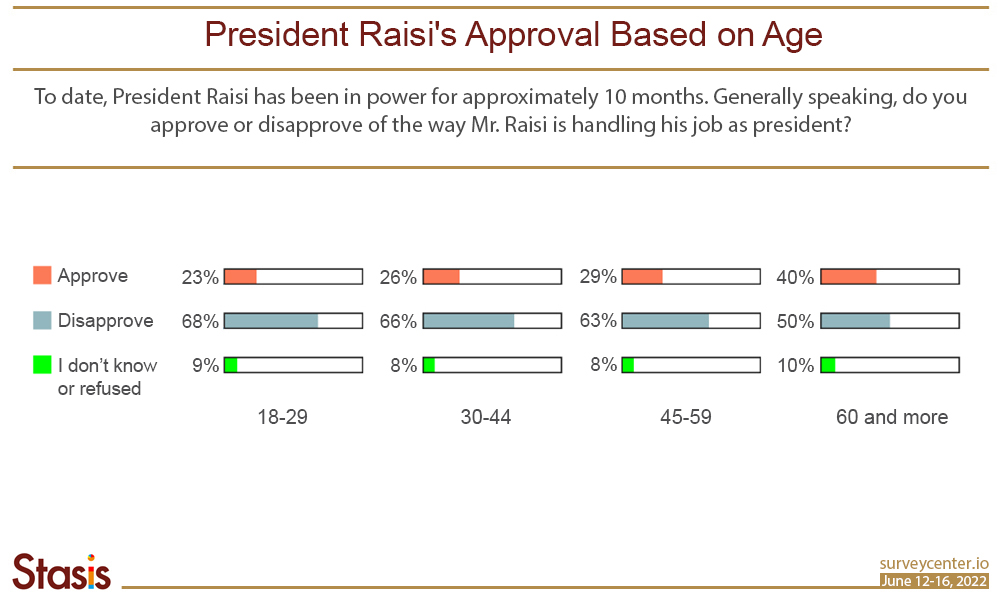
Moreover, Iranians who live in an urban area and who have a college degree were less likely to say that they approve of the performance of Mr. Raisi (with 24 percent and 22 percent correspondingly) as opposed to those respondents residing in rural areas or who do not have a college degree (with 39 percent and 30 percent correspondingly).
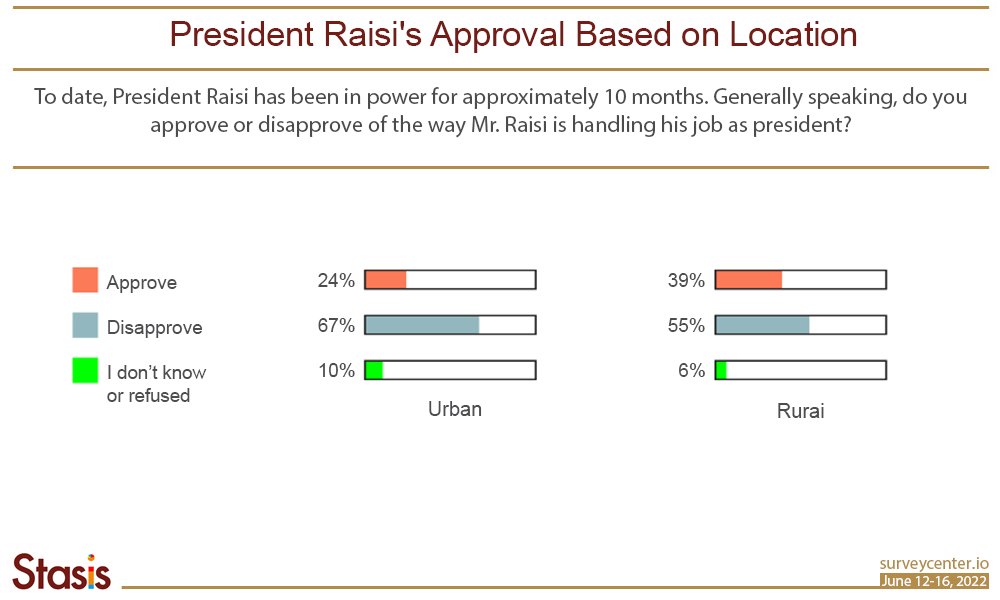
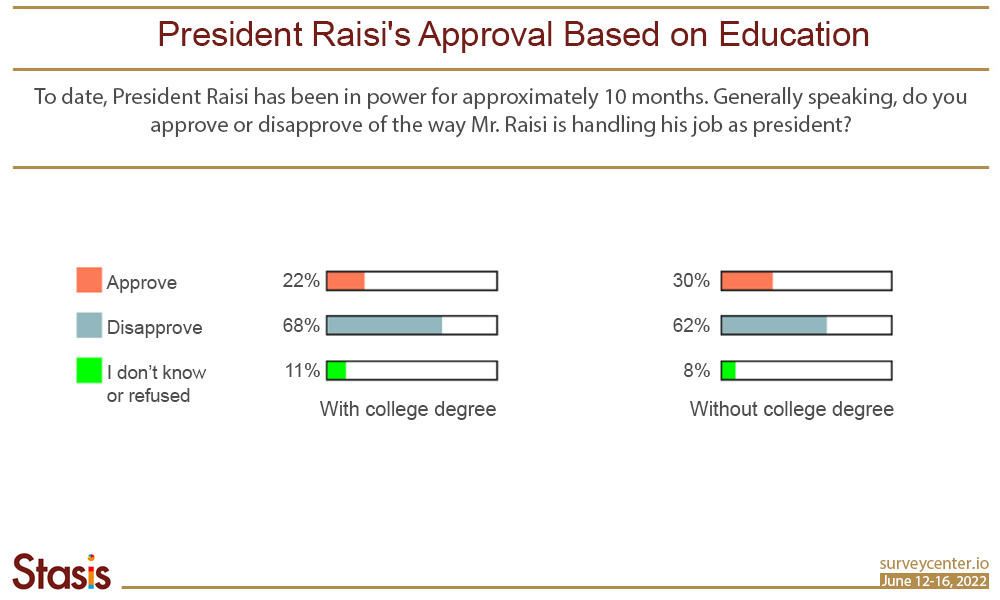
Iranians Have Little Confidence in President Raisi’s Capabilities
When respondents were asked if they believe President Raisi can solve the issues that the Iranians people face today, only 20 percent say he is fully capable of doing so. An additional 16 percent felt that he was capable only to a degree and another 10 percent felt that he was somewhat incapable of solving the most pressing domestic issues. A full 37 percent of respondents had no faith in the current president.
Question: To what extent are you confident that President Raisi is capable of solving the issues our people face? Is he very much capable of solving these problems, or he is not capable of tackling these issues?
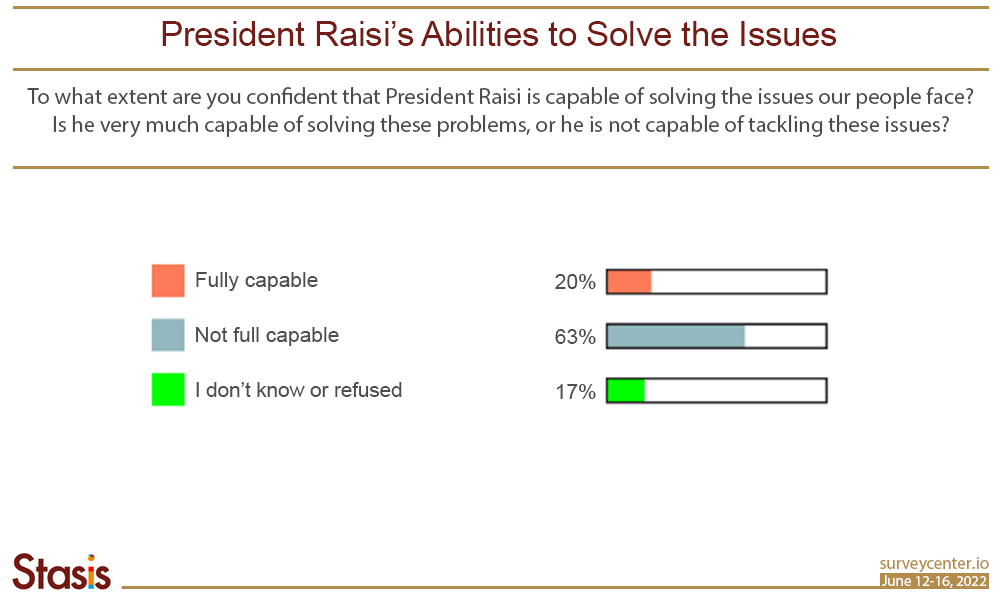
Among those who felt Mr. Raisi is not fully capable of solving the issues facing Iranians today, about 21 percent said that he is hindered by personal shortcomings, whereas 49 percent felt that external political factors are the main obstacle.
Question: Why do you believe that President Raisi is not fully capable of solving the issues our people are currently facing? Is the president hindered by personal shortcomings or external political obstacles outside the government involve here?
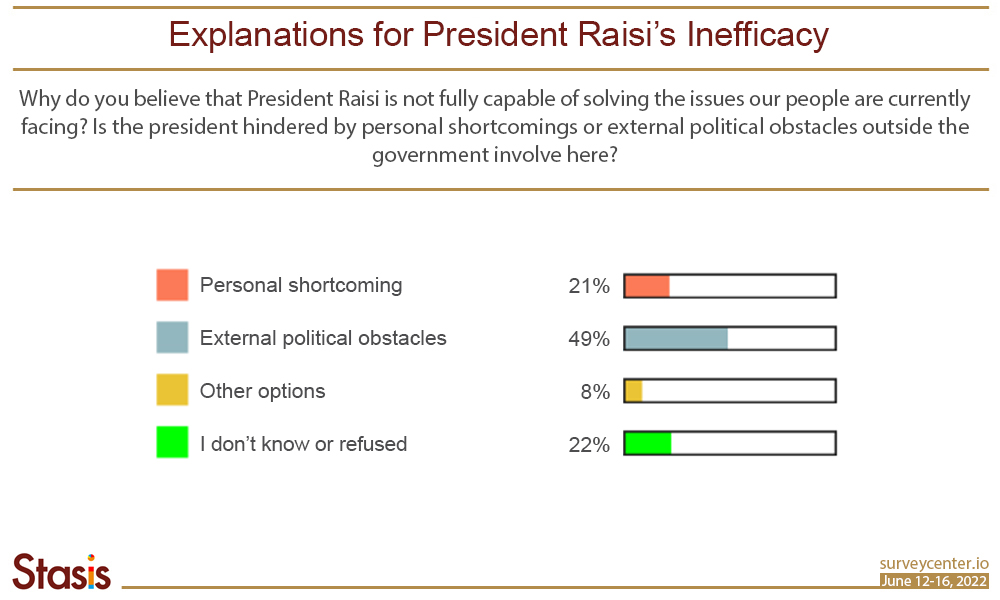
Only 51 Percent of Raisi Voters Would Vote for Him Again if They Could Go Back to the Last Presidential Election
Respondents in the survey were asked if they had the opportunity to go back and vote in the June 2021 presidential election, would they vote the same way again or differently? Among those who said that they voted for Mr. Raisi in the last presidential election, only 51 percent said they would vote for him again. Thirty percent of those respondents said that they would now prefer not to participate in the election.
Question: Thinking back to the last June’s presidential election, would you vote the same way again or differently? I mean, would you again have voted for Mr. Raisi, or another candidate? Or would you have preferred to not participate in the election?
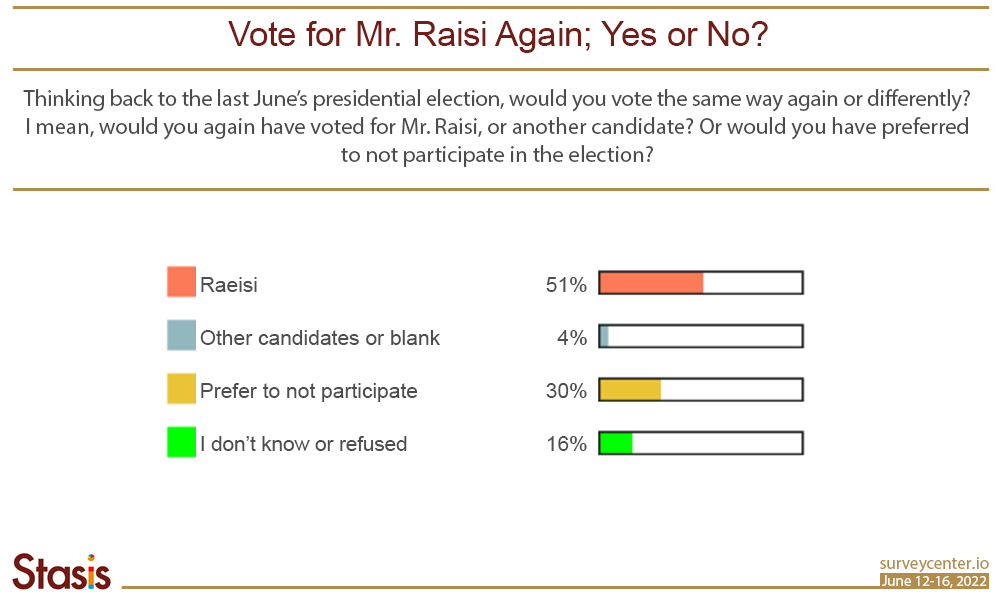
Iranians are Pessimistic About the Future
Only 19 percent of Iranians believe that the issues facing the country today will be better in the next year. More than half (58 percent) of respondents believe otherwise. Notably, younger Iranians are more pessimistic about their future than older generations.
Question: Do you think that the issues our people are currently facing will get better or worse in the next year?
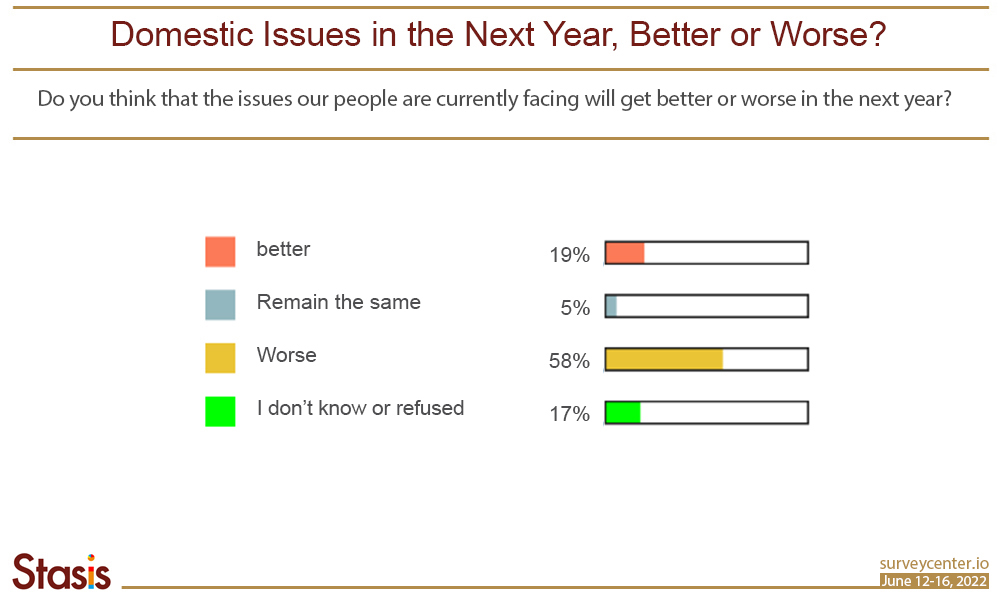
Iranians are Looking for Agreement Between Iran and the West Regarding Iran’s Nuclear Activities
Most Iranians (55 percent) believe that Iran should make a deal with the West regarding Iran’s nuclear issues, as opposed to only 17 percent who are explicitly against such an agreement. Younger Iranians, between the ages of 18 and 29, are more likely (60 percent) to favor the agreement.
Question: When we talk to people about Iran’s negotiations with the West about Iran’s nuclear activities, some believe that Iran should reach an agreement with West and resolve this problem. Others believe that Iran should not compromise with Western countries. What do you think? Should we make an agreement with western countries about our nuclear activities or not?
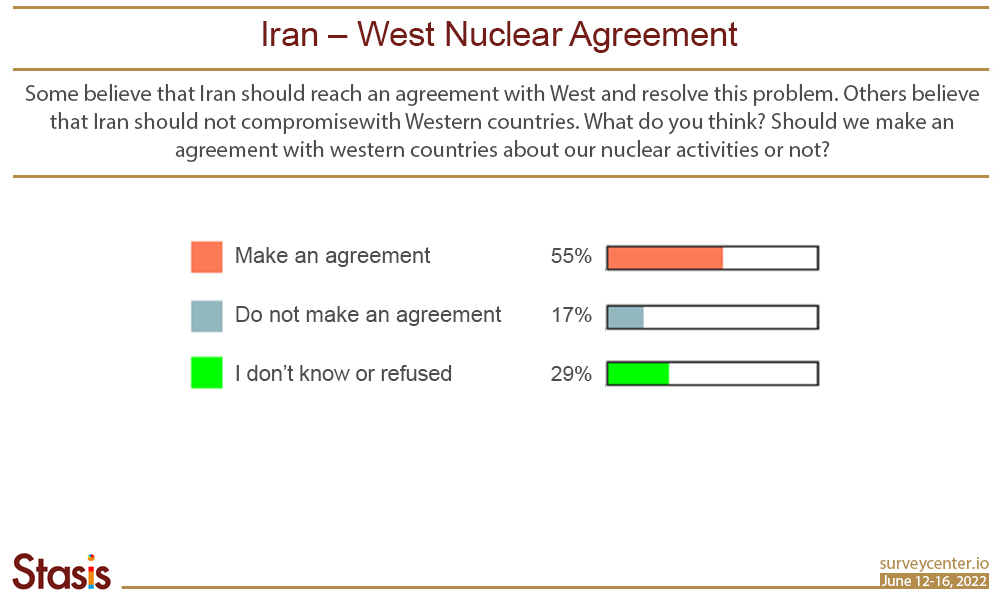
Moreover, 54 percent of respondents believe that if Iran could reach a nuclear agreement with the West, the economic issues facing the country would improve. Only seven percent of respondents feel that a deal would worsen Iran’s economic condition.
Iranian Distrust the Regime
One prompt from the survey asked respondents about the low turnout of the 2021 election, to which around 46 percent answered “distrust in the regime” was the leading reason for low election turnout. Sixteen percent of respondents said the economy, and six percent blamed the previous government (former President Rouhani’s administration) as the top reason for low turnout during the 2021 election.
Question: You might be aware that in the last presidential elections, less than 50% of Iranians participated. What do you think is the reason for this low turnout among Iranians in the presidential election?
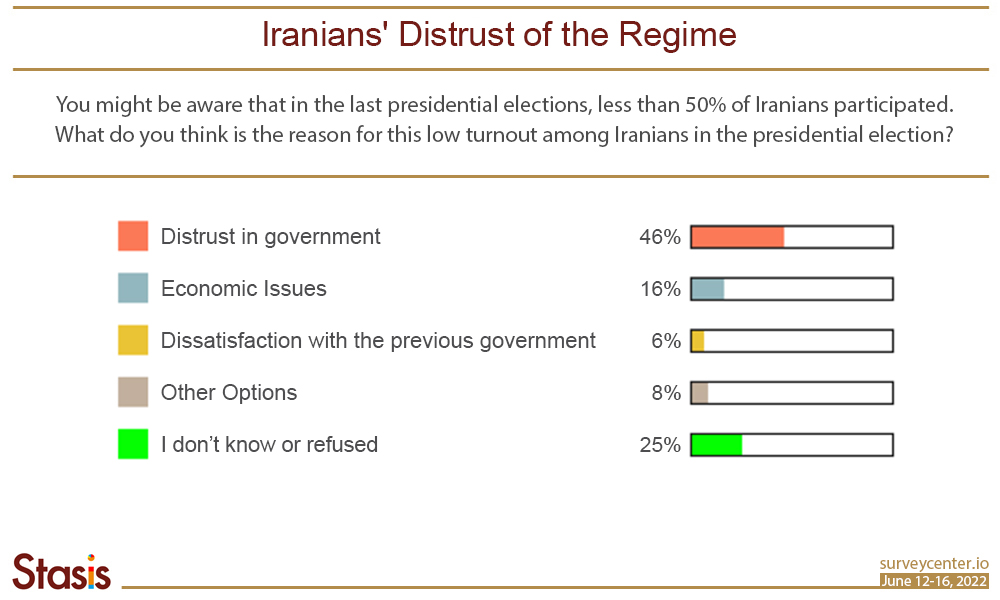
Iranians are More Favor of Ukraine than Russia
Amidst Russia’s invasion of Ukraine, Iranians report more sympathy toward Ukraine than Russia. Thirty-five percent of respondents mentioned they have sympathy toward Ukraine, as opposed to just 12 percent who favor Russia. Another 24 percent have no sympathy toward either country. The level of sympathy toward Ukraine is higher among Iranian youth between the ages of 18 and 29 (41 percent), as opposed to those who are 30 and older (32 percent).
Question: You might have heard lately of the war between Russia and Ukraine. Which country (if any) do you have more sympathy for? Russia or Ukraine?
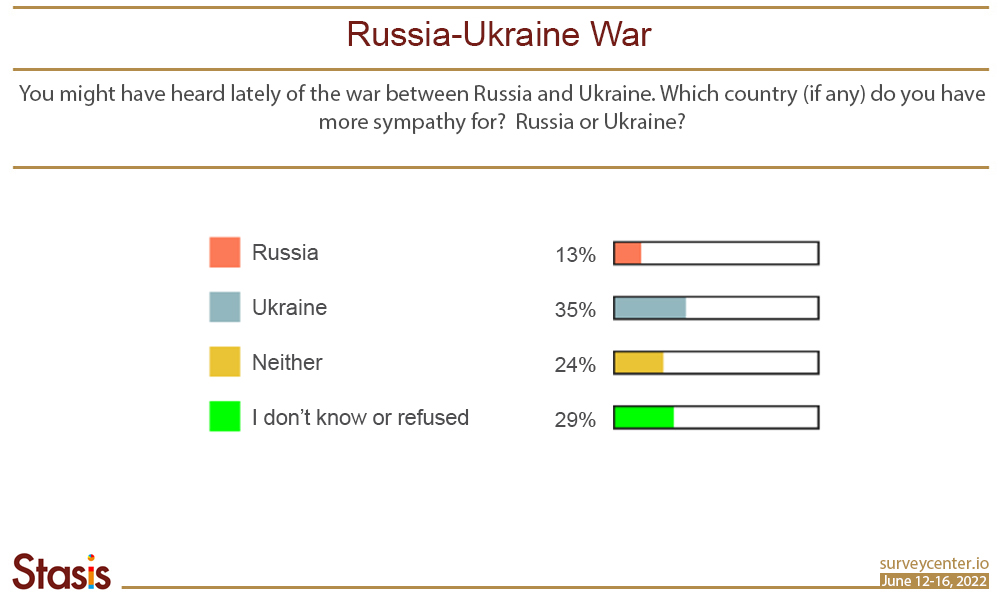
The Economy is the Most Important Issue Facing Iranians
Eighty-seven percent of Iranians named economic problems as one of the “most important” issues facing Iranians today. This is followed by affordable housing at 13 percent of responses, and political issues at eight percent (This is a multi-response question, meaning that respondents could name more than one issue. So, the sum of all responses will exceed 100 percent). This result among most respondents and especially youth is particularly notable. Ninety-one percent of respondents between the ages of 18 and 29 named economic issues as one of the “most important” problems facing Iran.
Question: Every time we conduct public opinion polls, respondents usually speak to a range of problems facing our people. In your opinion, what are the most important issues currently facing our people?
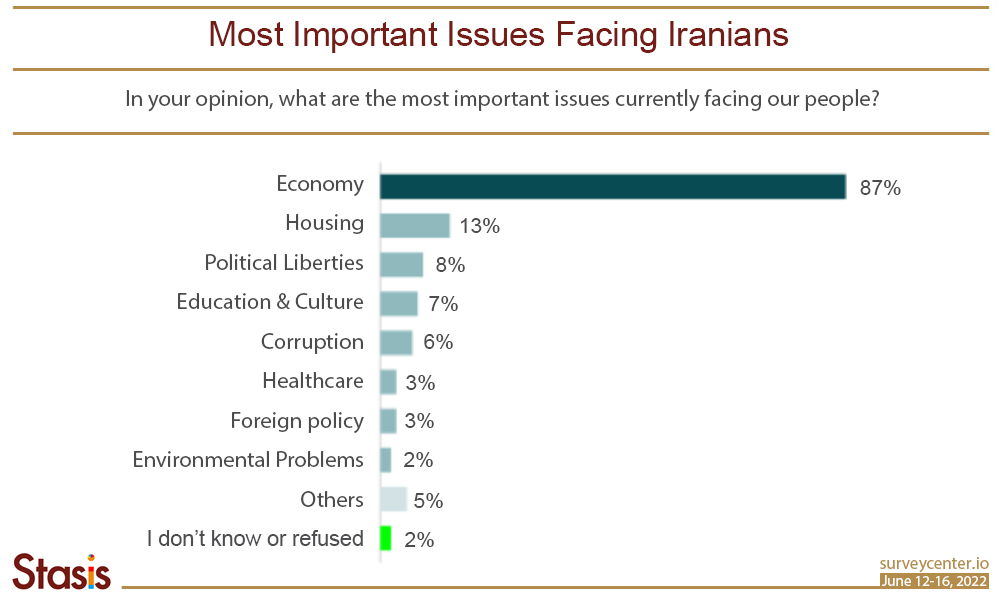
Remarks
The results of this poll have been interactively visualized in this link.
This is an interactive platform detailing the results of every question, distinguished by gender, age group, location, and education in a bar chart.
For each question, there is a bubble chart (consisting of many small circles), detailing the respondents’ information. Each circle represents a single respondent and by clicking on it, you can find the complete answer set for that particular respondent. The color coding is consistent between the bubble chart and bar chart for easy comparison.
Methodology
- Telephone interviews were conducted between June 12 and June 16, 2021, with a random sample of 1197 Iranians aged 18 and older living in Iran. Native Farsi speakers conducted the interviews during daylight hours.
- The proportional two-stage sample includes respondents from every province. Provinces have been sampled based on their population.
- Results are weighted by gender, age, and location (urban vs. rural areas) based on the Iranian national census of 2016 and 2018 statistical yearbook.
- Based on the sample, there is a 95% confidence that the margin of sampling error is ± 2.8 percentage points.
- Rates of respondent candor and reliability were appraised by experienced interviewers. Twenty-seven persons found to be lacking in these areas were removed from the sample.